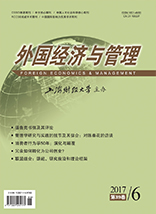At present, current popular self-perception theory, cognitive dissonance theory, and " foot in the door effect” based on the motive for behavior consistency, and moral cleaning effect & moral disengagement theory which contravene the motive for behavior consistency cannot explain the contradictory phenomenon of " good previously leading into bad subsequently” which happens on the same employee in workplaces. Moral license theory which is derived from ethics argues that previous moral behavior is the incentive for its follow-up wrongdoing. Based on a literature review, this paper discusses firstly the connotation of moral license, then regards previous good behavior in workplaces and individual life fields like organizational citizenship behavior, organizational care and bravery as the antecedents of moral license, deduces four types of deviant behavior classified by moral boundaries and observability and possibly resulting from moral license, discusses the moderating role of personal value identity in this process, and constructs theoretical analytical framework of whole moral license occurrence process in workplaces. It provides totally new analytical idea for the explanation of the contradictory phenomenon of " good previously leading into bad subsequently” which happens on the same employee. This framework includes several concepts or variables of good and deviant behavior and offers convenience for follow-up empirical modeling.
 / Journals / Foreign Economics & Management
/ Journals / Foreign Economics & ManagementForeign Economics & Management
JIN Yuying, Editor-in-Chief
ZhengChunrong, Vice Executive Editor-in-Chief
YinHuifang HeXiaogang LiuJianguo, Vice Editor-in-Chief
Why Does Good Previously Lead into Bad Subsequently on the Employees? Based on the Theory Framework of Moral License
Foreign Economics & Management Vol. 39, Issue 06, pp. 98 - 113 (2017) DOI:10.16538/j.cnki.fem.2017.06.008
Abstract
References
Abstract
Cite this article
Guan Tao, Kang Haihua. Why Does Good Previously Lead into Bad Subsequently on the Employees? Based on the Theory Framework of Moral License[J]. Foreign Economics & Management, 2017, 39(6): 98–113.
Export Citations as:
For
ISSUE COVER
RELATED ARTICLES




 9603
9603  11111
11111

